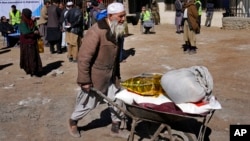The United Nations has warned that delivering life-saving aid to millions of people in Afghanistan could be “severely impeded” as donors have given only 6% of the humanitarian funding appeal for 2024.
Indrika Ratwatte, the humanitarian coordinator for the impoverished country, has urged the international community to redouble its commitment and increase financial support for the Afghan people.
According to a U.N. statement released on Tuesday, Ratwatte expressed “deep concern” over the current funding levels and noted that the U.N. had secured just $290 million of the $3.06 billion requirements.
“Such a significant gap between existing needs and available funding will severely impede the delivery of life-saving assistance,” the statement said.
U.N. agencies estimate that more than half of the population in Afghanistan needs humanitarian assistance, citing frequent natural disasters and years of war. They caution that the lack of donor funding is aggravating one of the worst humanitarian crises in the world.
The return of the fundamentalist Taliban to power in 2021 has compounded challenges facing humanitarian operations in the country.
De facto Afghan authorities have banned many women from public and private workplaces, including the United Nations, and forbidden teenage girls from attending schools beyond the sixth grade.
The Taliban have rejected persistent international calls to reverse curbs on women, saying their governance is aligned with Afghan culture and Islamic principles.
Critics blame Taliban restrictions for contributing to the humanitarian crisis and discouraging foreign donors.
The World Food Program stopped food assistance for 10 million Afghans in 2023 because of a massive funding shortfall.
The Taliban have dismissed claims their misogynistic policies are jeopardizing the flow of humanitarian assistance to Afghanistan, alleging donors are politicizing the aid.
“We don't need their assistance. Spare us from their [foreigners’] harm,” Taliban chief spokesman Zabihullah Mujahid told a recent social media-hosted seminar.




